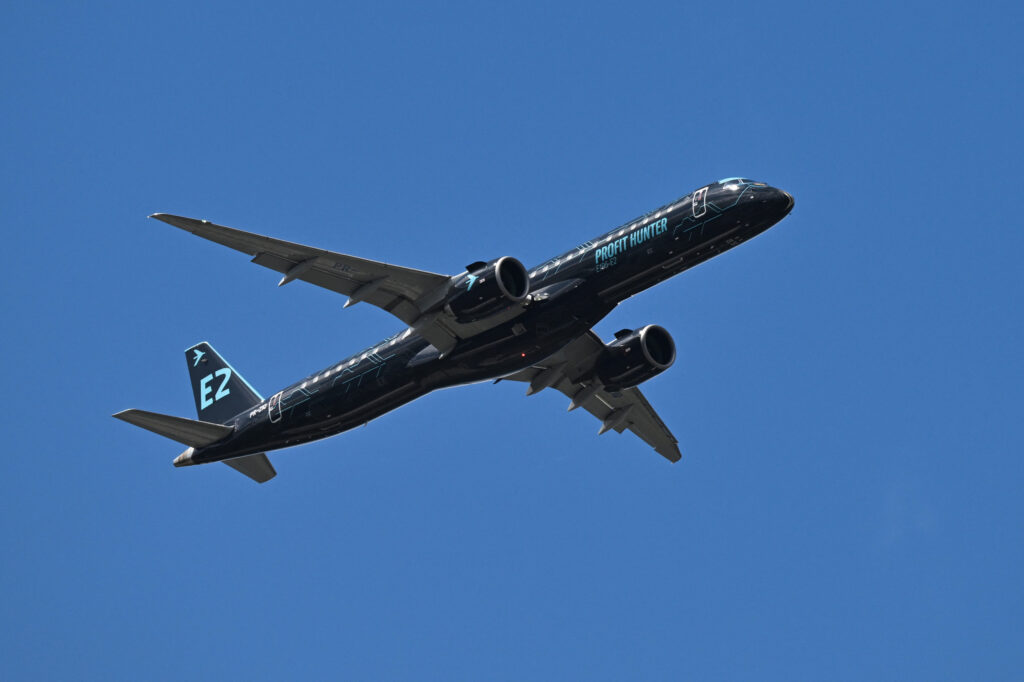Brazilian aircraft manufacturer Embraer this week announced the introduction of a first-of-its-kind system that automates the takeoff process for its E2 aircraft, one of its narrow-body commercial planes. The takeoff phase of flight has traditionally been managed solely by the human pilot, and the new system is expected to reduce pilot workload in the cockpit.
The announcement was made at the Farnborough Airshow, where the aircraft manufacturer highlighted the system’s potential to optimise payload and extend range from challenging airports such as London City Airport (LCY). Embraer said no modifications to the aircraft would be required beyond a software update to automate the takeoff process.
Flight-phase automation has been a part of commercial aviation since the 1960s, but its use has become more common in the past few decades, sparking controversy in the aviation industry.
An Embraer E2 Profit Hunter E195-E2 takes part in an air display on the opening day of the Farnborough International Airshow 2024, southwest London, on July 22, 2024. An Embraer E2 Profit Hunter E195-E2 takes part in an air display on the opening day of the Farnborough International Airshow 2024, southwest London, on July 22, 2024. Getty Images
Fears are growing among pilots about potential job loss and reliance on automated systems, and the world’s largest pilots union, the Air Line Pilots Association, has expressed major concerns about the move to autonomous flying.
“While ALPA supports the use of technology to enhance the safety and sustainable growth efforts of the air transportation system, we oppose, and will continue to oppose, some aspects of these new concepts, including autonomous flight operations, the application of artificial intelligence aimed at removing the pilot from the cockpit, and reduced human input in operating an aircraft,” a union spokesman told Newsweek.
Embraer’s auto-takeoff technology is a world first for a commercial aircraft, and the E2 Enhanced Takeoff System (E2TS), scheduled to enter service by the end of 2025, claims to extend range by about 350 miles. The pilot will still be responsible for setting the heading and power levers, but the system will manage turns.
Ella Atkins, chair of Virginia Tech’s Kevin T. Crofton School of Aerospace and Ocean Engineering, said technical concerns about automatic takeoff, one of the most critical and complex parts of flight, have been overblown.
He said pilots already trust the autopilot and instruments to fly safely in bad weather. “Giving pilots more responsibility for takeoffs is not going to significantly increase the confidence of well-trained pilots,” he said.
Embraer’s work on the auto-takeoff system comes in the wake of two high-profile Boeing 737 crashes that were linked to automated flight-control software that wasn’t properly communicated to pilots, and highlights the delicate balance between technological innovation and aviation safety.
While E2TS promises to improve efficiency and reduce pilot workload, Atkins doesn’t believe that automating flight operations will replace pilots in the cockpit, as some have suggested.
“Until a certification body such as the FAA approves fully autonomous flight (without pilot oversight), flight crews will continue to monitor and intervene in the automation. We expect that at least one pilot will be able to oversee autonomous flight for the next decade. This is because society lacks trust in autonomous flight, rather than because autonomous flight cannot function reliably in all conditions,” she said.
Despite advances in in-flight technology, there is still a huge lack of trust in fully autonomous systems, especially among the flying public. Atkins predicts that pilot oversight will be mandatory for at least the next decade, though that’s due to a lack of trust rather than any technical flaws.
Have a story you think Newsweek should feature? Have a question about this article? Contact us at LiveNews@newsweek.com.
Rare knowledge
Newsweek is committed to challenging conventional wisdom, seeking common ground and finding connections.
Newsweek is committed to challenging conventional wisdom, seeking common ground and finding connections.

